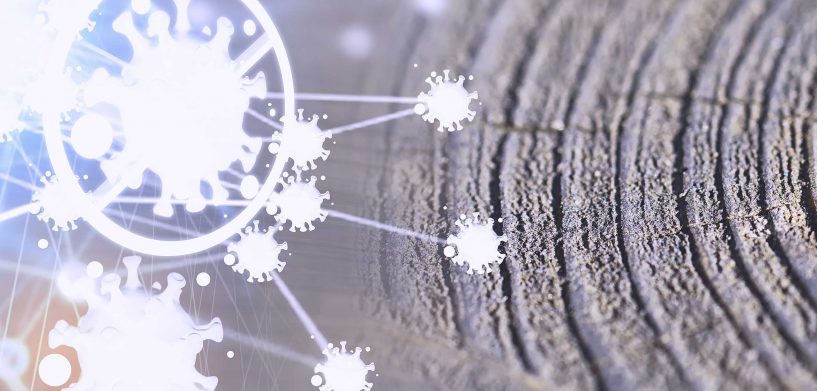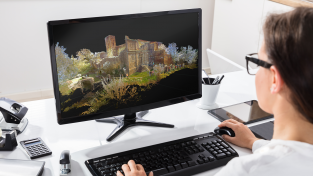The coronavirus has a firm grip on the world and, therefore, on our businesses and our personal lives. How can we successfully navigate through these challenging times? In a recent interview, Katherine (Katy) Broder, CEO of GeoMax, revealed three keys on how to successfully do business despite or even because of the omnipresent pandemic.
Build upon what is already there
In a crisis such as the pandemic we are currently living in, resources need to be planned even more carefully than usual. At the same time, changing circumstances demand new approaches and strategies. This creates a trade-off between the necessary restrictive monetary management and seemingly unavoidable investments essential for further development.
However, before outlining a completely new strategy or only setting your hopes on new equipment, a campaign, or other activities to keep you in the game, one should first look at what is already there, striking new paths to adapt to the changing situation by building upon what was already there before.
“The closeness to our customers is one of our keys to success,” said Broder. “We overcame challenges of social — or rather physical — distancing by exploring the digital world. Our customer group was already on different platforms because there was nothing else to do. We could switch onto that.”
Building upon strong assets that are already there and discovering new ways to engage them in the changing circumstances helps preserve some stability in uncertain times.
Open your eyes to opportunities the new situation offers
This might sound contradictory, but it is vital to embrace the new in changing times without forgetting about the good things already in place. Humans are creatures of habit, and many feel more comfortable in familiar, predictable and controllable situations. Therefore, it is probably only natural that in a crisis, most of us only want one thing, back to normality, back to the old and the known.
With precisely this mindset, we run the risk of coming out of the crisis in worse shape. The mentality of embracing the new is the key. Who can guarantee you that you will ever get back to normal again? New situations mean new challenges — but also new opportunities. Especially in times of change, the two often emerge as a couple.
GeoMax, for example, had to postpone all training of the GeoMax Academy. But the team could not be stopped by this situation. Dozens of global and regional webinars were organised and turned the challenge of the cancelled events into an opportunity. Since many people were stuck in quarantine, they now had time to attend webinars and interact.
The digital world, in general, is playing a crucial role in this pandemic. The crises revealed that some companies were not using all the opportunities the digital world has to offer to the full extent. Nobody knows when or even if they would ever have exploited potential if it were not for the pandemic who emphasised this area.
Also, the readiness from the customer side to embrace technology and doing business differently enormously increased. The pandemic has been a trigger to go more digital and opened a door that won’t be closed even when the situation will “calm down again”.
“I see that there is a continuous path of growth and new opportunities coming our way as technology and digitalisation are developing. I am very excited to see how things will evolve moving forward,” said Broder.
Having to switch to digital solutions is not the only difficulty companies face in this pandemic. One of the biggest challenges is that the personal lives of the people are so much impacted.
“Of course, we want to drive and support our customers and partners with their projects and business, but the personal side has become much more in the forefront,” explained Broder.
Also, here challenge and opportunity are walking side-by-side. Obstacles and hardship arise as companies face challenging situations with their customers.
“This, in turn, brings us much closer to each other as human beings, the families and the local situations in the different markets. We can strengthen the bonding with our customers,” said Broder.
So when one is ready to tackle the challenges and goes about it with open eyes, you can discover unique opportunities in the middle of the battle.
Give personal interaction high value
Doing successful business during a pandemic is not the only thing we should invest in. The well-being of each individual in the company is a true key if we want to thrive during a crisis.
The pandemic is not only affecting companies and professionals. Private lives have been deeply impacted. Raising numbers of, for example, mental health issues and domestic violence show how extreme the events of recent months have been. These personal challenges and quarantine, sickness, or children that suddenly need to be homeschooled can impact behaviour in the team and work performance. Work-life and private life becomes (even more) strongly dependant on each other.
Broder is experiencing this in her own life: “I have to deal with myself, my personal situation and also play my part on the business side,” she said. “Before the pandemic, professional and business life were not detached, but were less dependent on each other.”
Some people might see the blurring boundaries between the two areas as another negative consequence of the pandemic, it can also serve to see each other more holistically. For most people, health is something very private. Since COVID-19, it has become more common for all of us to ask ourselves — even strangers — how our health is. We recognise the people as a whole and realise that professional identity is only one part of them. This is positive because it makes us more human yet no less business-oriented. As employees able co-workers feel heard and valued as a whole person, they can better find solutions, get help, and engage in their work environment.


















